Publications
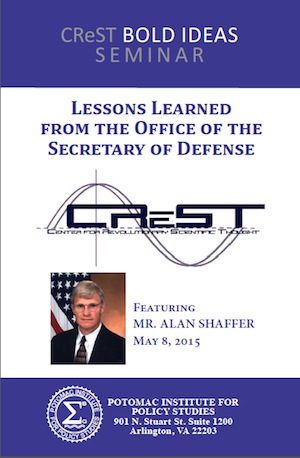 Mr. Alan Shaffer’s seminar provided key insights into personal experiences throughout his career, both in the Air Force and in public service. Furthermore, Mr. Shaffer spoke and reflected on lessons and highlights acquired from more than a decade of serving in senior roles in the Pentagon. Attendees were provided a glimpse into his Pentagon career as a leader in research and engineering, including assignments as the Acting Assistant Secretary of Defense for Research and Engineering. In this position, Mr. Shaffer was responsible for formulating, planning and reviewing the DoD Research, Development, Test, and Evaluation (RDT&E) programs, plans, strategy, priorities and execution of the DoD RDT&E budget totaling roughly $25 billion per year.
Mr. Alan Shaffer’s seminar provided key insights into personal experiences throughout his career, both in the Air Force and in public service. Furthermore, Mr. Shaffer spoke and reflected on lessons and highlights acquired from more than a decade of serving in senior roles in the Pentagon. Attendees were provided a glimpse into his Pentagon career as a leader in research and engineering, including assignments as the Acting Assistant Secretary of Defense for Research and Engineering. In this position, Mr. Shaffer was responsible for formulating, planning and reviewing the DoD Research, Development, Test, and Evaluation (RDT&E) programs, plans, strategy, priorities and execution of the DoD RDT&E budget totaling roughly $25 billion per year.
Mr. Shaffer discussed the acquisition and technology strategies employed at the DoD. He addressed the need for project managers to own the technological baseline, with an emphasis on technical expertise and experience. While the DoD operates on very complex statutory processes, Mr. Shaffer spoke to the Department’s ability to continue to be an innovating force. The DoD works in tandem with commercial technologies and Congress as partners in the technology innovation process. Mr. Shaffer posed his ideas for fueling agile innovation in the DoD through the development of open systems that work with industry, creating new markets for upgrades, and providing opportunities for creativity across all systems. Mr. Shaffer engaged the younger generation of attendees and reflected on the most important lessons from his career.
Download pdf here.
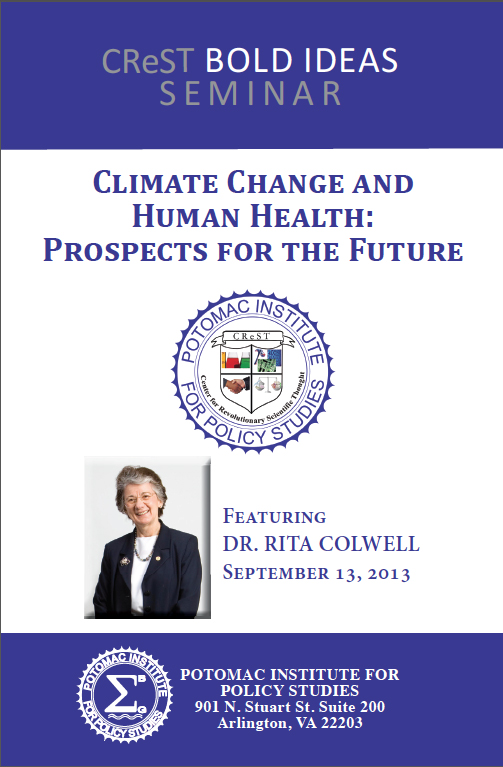 Studying infectious diseases and their causes, sources and spread can help build models to predict their spread, especially when factoring in ongoing climate change challenges.
Studying infectious diseases and their causes, sources and spread can help build models to predict their spread, especially when factoring in ongoing climate change challenges.
Potomac Institute Board of Regents member Dr. Rita Colwell spoke about “Climate Change and Human Health: Prospects for the Future.” Using cholera as an exemplar infectious disease, she considers the impact on human health in a world undergoing climate change. Cholera, which is caused by the bacteria Vibrio cholera, is found in many environments throughout the world, which leads to epidemics in areas with poverty, poor sanitation, and unsafe drinking water.
In an effort to understand these epidemics, Dr. Colwell’s research group has made use of satellite imagery and modeling to predict the spread of infectious disease, finding correlations between outbreaks of cholera and chlorophyll on the sea surface, air temperature, and rainfall. In analyzing the evolution of Vibrio cholera, Dr. Collwell notes that the bacteria and other Vibrio human pathogens are extremely similar to bacteria isolated from thermal vents 2500 meters below sea level.
With these novel findings, Dr. Colwell evaluated the recent cholera epidemic in Haiti in January 2010. Even before the earthquake, the record high rainfall and the hot summer were perfect preliminary conditions for the spread of cholera. The earthquake, however, led to a change in river pH, which, in combination with the other conditions, resulted in explosive growth of the bacteria. The case study of cholera in Haiti is an example of the link between climate change and infectious disease. The rise of heavily populated areas coupled with increased flooding and hotter temperatures will result in refugee migration, which can escalate the spread of disease worldwide.
The modeling can also be used to project the spread of other infectious diseases, as seen with Dr. Colwell’s research into Yersinia pestis in Tbilsi, Georgia. Moreover, satellite imagery and modeling can enhance the surveillance and response mechanisms of global health organizations. These advancements, along with further investment in safe drinking water and sanitation, could greatly reduce the spread of disease worldwide.
Download pdf here.
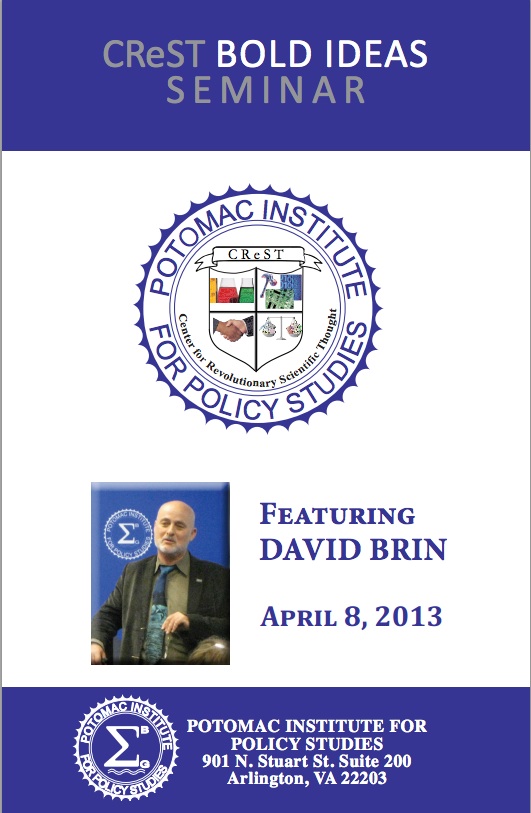 The CReST Bold Ideas Seminar series kicked off April 8, 2013, with David Brin - Scientist, Futurist, Author - speaking on "The Future Golden Age."
The CReST Bold Ideas Seminar series kicked off April 8, 2013, with David Brin - Scientist, Futurist, Author - speaking on "The Future Golden Age."
David Brin, a world–renowned science fiction author and the first speaker for Bold Ideas speaker series at the Potomac Institute, brings a different prospective when looking at the future, or as he refers to “the golden age”. Brin firmly believes that technology and science will help solve a majority of life’s hard problems, but humans are holding back because of a “crisis of confidence”.
Brin reminded the audience that today humans have powers that many believed centuries ago only gods possessed, such as light with a flick of a finger and flying in the sky. Humans have changed the structure of society from a pyramid arrangement, where a few ruled, to a more leveled field, from clans and tribes to multi-organization networks. Technology is the “game changer” for the future. Achievements, such as led lights and medical advancements, show how technology has enhanced the way of living. According to Brin, this is the “age of amateurs”. Humans educate themselves using technology, making it where they do not need professionals or experts for every problem that is faced.
Download pdf here.
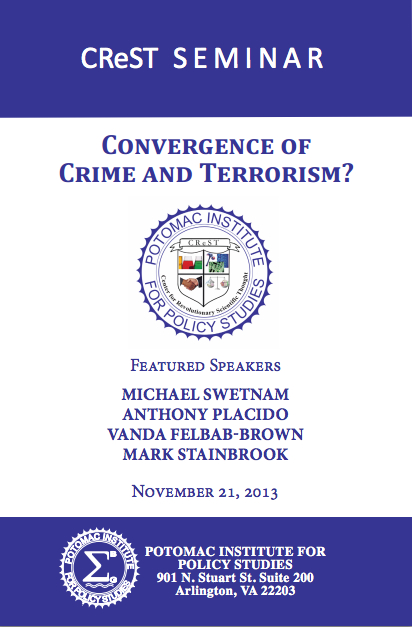 The “Convergence of Crime and Terrorism?” seminar was held at the Potomac Institute for Policy Studies on November 21, 2013. The seminar centered on the concept that criminal activity and international security are related. Drawing from personal experiences in law enforcement, federal government, and academia, the three panelists evidenced the ways in which crime and terrorism are linked and how law enforcement can stem this issue.
The “Convergence of Crime and Terrorism?” seminar was held at the Potomac Institute for Policy Studies on November 21, 2013. The seminar centered on the concept that criminal activity and international security are related. Drawing from personal experiences in law enforcement, federal government, and academia, the three panelists evidenced the ways in which crime and terrorism are linked and how law enforcement can stem this issue.
In sum, it is not accurate to describe transnational organized crime and terrorism as monolithic; yet it is known that they are inextricably linked. All three panelists provided various methods for dealing with this pressing issue. Mr. Placido argued that there is not a one size fits all approach, but that targeting the infrastructure of transnational organized crime can be effective. Dr. Felbab-Brown believes that the goal is to import the image of a “good” criminal, a criminal that does not collaborate with terrorists, is not very violent, is removed from society, and is without the capacity to corrupt institutions. Concluding the seminar, Mark Stainbrook stated that the goal of law enforcement is long-term prevention rather than detection, and that there exists a need to implement community-based police strategies.
Download pdf here.
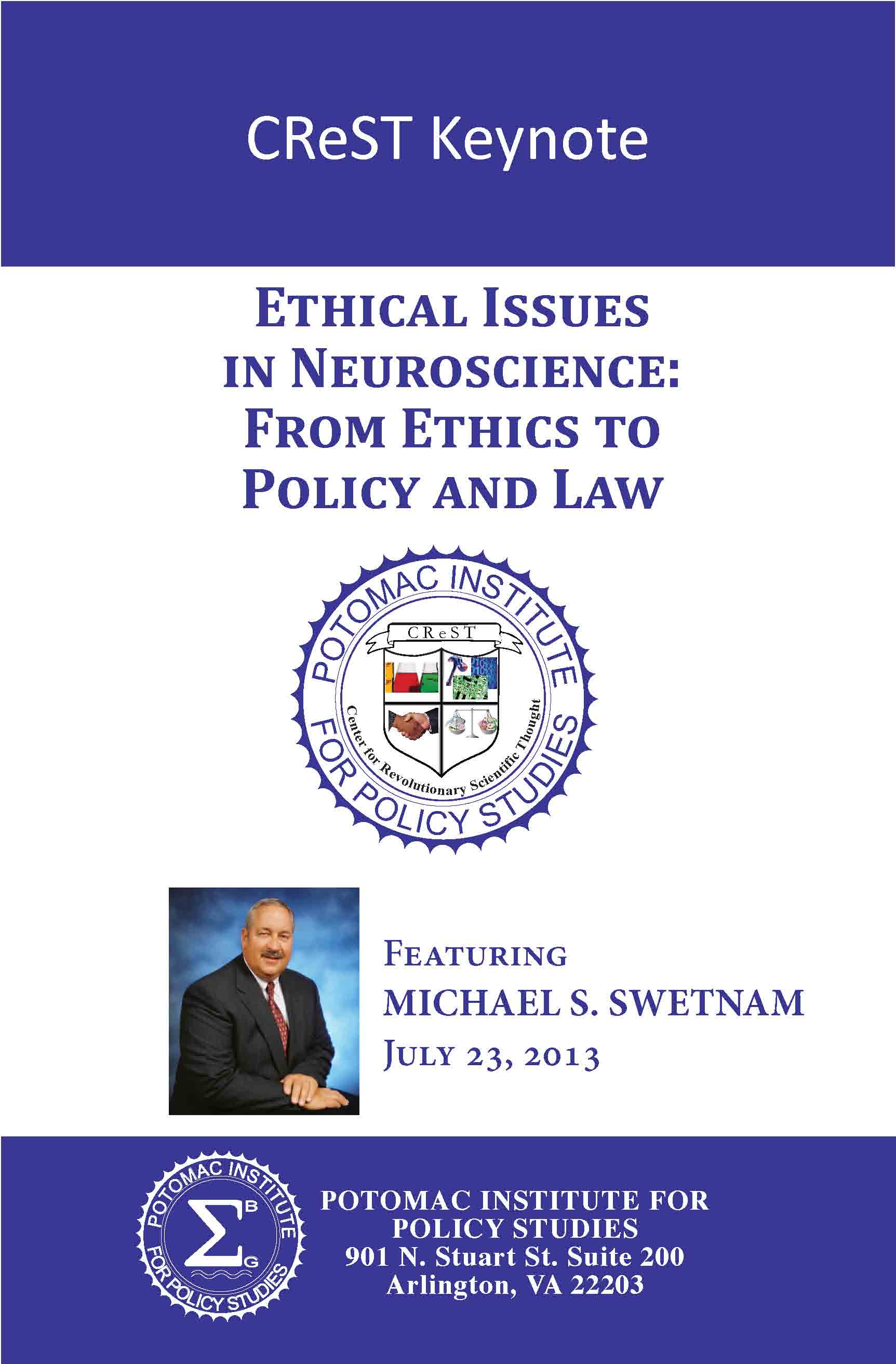 Potomac Institute CEO and Chairman Michael S. Swetnam provided the keynote speech to the neuroscience community at a one-day symposium on "Ethical Issues in Neuroscience."
Potomac Institute CEO and Chairman Michael S. Swetnam provided the keynote speech to the neuroscience community at a one-day symposium on "Ethical Issues in Neuroscience."
Attendees included those who are working in or interested in learning about the intersection of neuroscience with policy, law, ethics, media, and society. Speakers included personnel from government, industry, think tanks, and academia. The symposium addressed the topics of neuroethics in defense, promoting and teaching neuroethics, and transitioning the focus from ethics to policy and law.
Download pdf here.

